4BR Time Team - 125 years of Carlton Main
7-Jun-2009Tim Mutum relates the story of the Carlton Main Frickley Colliery Band which this year celebrates its 125th anniversary.
The brass band world is littered with bands with names that on the surface make no sense.
Names
Whilst Fodens was named after the lorry firm of the same name and Brighouse and Rastrick comes from the two small Yorkshire towns where this famous outfit is based, others such as even the great Black Dyke Mills need some analysis.
A case in point is the Carlton Main Frickley Colliery Band which this year celebrates its 125th anniversary.
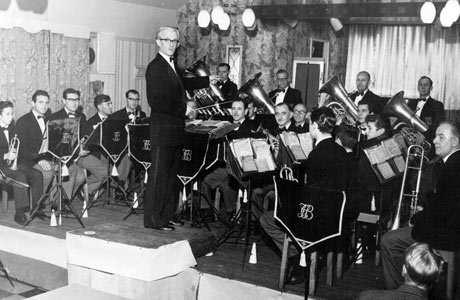
Jack Atherton and Carlton Main - late 1950's , with a young Jim Shepherd as top man
Complicated
One would think that the word “colliery” was a giveaway and that the band was simply named after the pit where it was based. Well, partly true but in reality a little bit more complicated than that. It actually started life in 1884 as the South Elmsall Village Band, which is right in the heart of what was once the South Yorkshire coalfield.
The village is within a few miles of Brodsworth, Markham – both of whom had mining bands - and Grimethorpe, undoubtedly the most famous of all mining bands. Most of the South Elmsall players came from the nearby South Kirkby Colliery.
Adopted
In 1905 the band was adopted by the Frickley Colliery. This colliery was sunk in the grounds of the Warde-Aldam Estate. Frickley village is also part of the estate, hence the name of the colliery.
The colliery was owned by the Carlton Main Coal Company. This was a very strong company and in the following years it built up both the band and the pit.
Stories
There are different stories about when the band took its present name. One suggests that in 1923 it took on the title of the colliery and became the Frickley Colliery Band and later on added Carlton Main, and another suggests that in 1924 it simply changed to the Carlton Main Frickley Colliery Band.
To complicate matters in the prizes list for the Belle Vue contests in 1922 and 1923 it was called South Elmsall and Frickley Colliery.
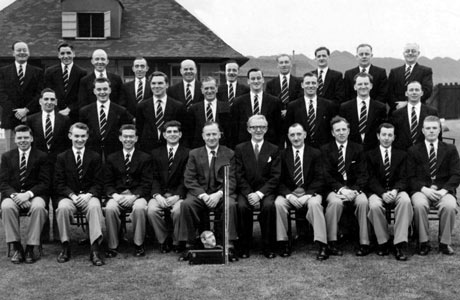
Carlton Main in the early 1960s with David Read and a shrunken head as a mascot!
Carried the name
However, since the 1920s it has carried the name it still has today. Certainly, at that time recognising the high ambitions the company had set, players from other mining bands joined. The road to becoming a brass band household name had begun.
Attraction
Between 1919 and 1938 Carlton Main was conducted by Noel Thorpe, who was also for a time professional conductor of Slaithwaite Band and something of an autocrat. He was succeeded by Albert Badrick, a former member of Callender’s who held the position until 1947.
The attraction of better players and conductors did result in some contesting success but no more than other mining names of the time such as Creswell, Harton and St Hilda.
Big result
The first big result was a win at Belle Vue in 1922 under Noel Thorpe, pushing Black Dyke into second place followed by Besses, Wingates, Perfection Soap Works and Gwauncaegurwen. At Belle Vue they were 6th in 1923, 5th in 1927 and 4th in 1928. At the Crystal Palace they were placed 4th in 1925 and 3rd in 1927.
After this whilst other colliery bands continued to feature – Harton, Creswell, Abram, Bickershaw and Blackhall – Carlton Main’s next placing was not until 1941 when they were runner up to Fairey Aviation Works at Belle Vue. Other placings at Belle Vue were 4th in1944 and 5th in 1946.
Near misses
A third place at Belle Vue in 1948 suggested a continuation of a succession of “near misses” and they were nowhere to be seen at London, but in that year the arrival of a professional conductor heralded the start of the most successful period in the band’s history.
In August of 1948 Eric Ball was appointed professional conductor and it was he who successfully guided them to third place at Belle Vue as well as conducting the winning band, CWS (Manchester). The third place was repeated in 1950. The band toured Holland three times in 1949, 1950 and 1952 and also won prizes in international competitions.
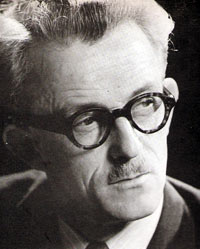 To their peak
To their peak
The year 1954 saw the appointment of the man who was to lead Carlton Main to its peak. Bill Sykes (father of Ray and Steve) was colliery manager and in that year he became band chairman.
He brought in Jack Atherton (right) as the first step towards turning Carlton Main into a major force.
Pedigree
Atherton had a banding pedigree. He played tenor horn for Harton Colliery and in 1931 moved to London and joined Hanwell, returning to Harton in 1939 as musical director. He remained there until 1950 and in 1952 had succeeded Fred Roberts as bandmaster at CWS (Manchester).
Searching for players
Jack Atherton and Bill Sykes used their weekends touring the north of England searching for new players. One of their most high profile signings was Jim Shepherd. He was working in the local Co-op store. Jim takes up the story, “The band were on their way up to Edinburgh for the contest, and Jack Atherton stopped off on the way to see me.
That night Jack talked me into it – I handed in my notice at the grocer’s and they picked me up on the way back from Edinburgh. I’d made up my mind there and then – as Jack said, I could stay where I was and become the local grocer, or I could go down to Yorkshire and get into the band business.”
Character
In Arthur Taylor’s book “Labour and Love – An Oral History of the Brass Band Movement” (Elm Tree Books, 1983) Bill Sykes reveals more of the character of Jack Atherton. He tells of how Atherton made players recognise the need to up their own images and become more professional in their approach. He was a hard worker and made players understand that they represented an industry.
The standards were high as Sykes related, “he came up to me one day and said, ‘We had a concert the other night, and him and him and him and him – they were miming, not trying, no sound coming out of their instruments.’ Right, I said, what do you want me to do about it? ‘I want them out, finished.’ So I fired all four of them. And they all four went to Grimethorpe, they were brilliant players in their own right, you see.
Course, next year, Grimethorpe beat us at the contests. I say to Jack: what the hell have you done, making me get rid of those players? They’re bloody helped Grimethorpe to beat us? Jack says, ‘It’s discipline that counts, Mr Sykes, discipline.’
Toilet break!
Another story from the same book is well worth relating.
The band were playing at Princes Street Gardens, Edinburgh in a massed band concert. Jack Atherton wasn’t conducting, it was Eric Ball. On this occasion the players had been on the beer at lunchtime and Arnold Tinsley – a real character – decided he needed the toilet. So he got on his hands and knees and crawled between all the cornet players to the door at the back of the platform.
He pushed open the door and the first thing he saw was an immaculate pair of polished shoes – Jack was standing there. Arnold looked up – still on all fours – and says, “Oh, I’m sorry, Mr Atherton.” Then he crawled all the way back to his seat and finished the concert. One of Jack’s rules was that he would never let anyone leave the stage during a performance!
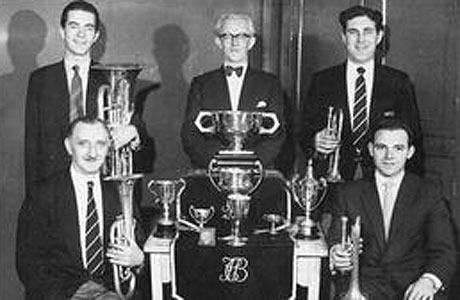
Quartet success: The succesful Carlton Main Quartet champions
Profile signings
Other profile signings were Ken Aitken- Jones, Irvin Vaines and David Read, who had two stints with the band. In1949 he joined at the age of 15, cycling nine miles each way from his home in Askern and found himself playing under the baton of Eric Ball. Quite an experience for such a young man! He left in 1953 to join the Band of the Welsh Guards.
On leaving the army in 1956 he worked at the Morris Cowley Works and played with the band but was unsettled and this news reached Jack Atherton. David Read takes up the story, “Mr Atherton was a very persuasive person. He told me of his future plans for the band and that he had the backing of the colliery management. The outcome of the talk was that I would be coming back to my old band, Carlton Main Frickley Colliery, at the end of 1956.”
Demon
David Read commented that “Jack Atherton worked like a demon in rehearsal. He marked every bar of each player’s part with red and blue pencil; each colour meant something important and had to be observed.” Eventually, during this period none of the band were required to work underground at the pit. Every day the players would work for two hours on the pit top and then went to the band room for sectional and full rehearsals. As David Read said, when they competed no band was better prepared than Carlton Main!
Limited success
Disappointingly, this preparation yielded only limited success at the big two contests. The band’s crowning moment was victory at Belle Vue in 1958 on Eric Ball’s Sunset Rhapsody. Atherton also secured 2nd place at Belle Vue in 1957 and 1959 and a 3rd in 1956.
The only rewards in London were 3rd in 1957 and runner up in 1959 and 1960. Jack Atherton remained musical director until 1969 but he had no success in the Area contest during the 1960s, not qualifying for the finals at all and only a 4th prize at Belle Vue in 1963 and second at the Open in 1969.
He did however win both the Edinburgh International Festival and the National Coal Board Championships several times.
Slump
Roy Newsome, in his book “The Modern Brass Band - from the 1930s to the New Millennium” (Ashgate 2006) suggests that one theory for the cause of this slump was that several key players defected to near neighbours Grimethorpe Colliery.
However, contest results aside Atherton had made Carlton Main one of the leading concert and broadcasting bands of that time and they had a reputation equal to CWS (Manchester), Faireys, Fodens Motor Works and Black Dyke Mills.
Granada win
After Atherton’s departure Bill Lippeatt conducted for a time followed in 1970 by Robert Oughton. The band won the area contest in 1971 and achieved second prize at the Open in 1972, but had little further success in that decade other than winning the Granada Band of the Year competition at Belle Vue in 1978 under Denzil Stephens.
Conductors came and went after the departure of Robert Oughton – Major Arthur Kenney (1975), Denzil Stephens (1977) and David James (1978 – 1980). Kevin Bolton, a former principal cornet player, also became resident conductor, later fulfilling the role of professional conductor.
Miners Strike
The miner’s strike of the 1980s crippled the band and at the end of the dispute in 1985 it was down to six players. They never fully recovered and a further blow came in1993 when the pit itself closed.
Surely the end of this famous band was approaching? However, those that remained would not hear of the band folding.
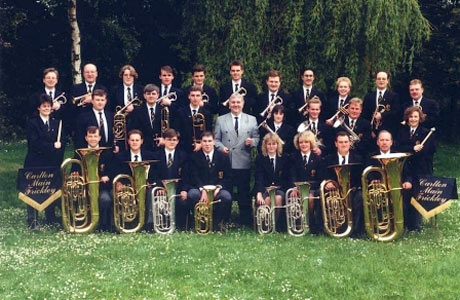
Carlton Main circa 1994
Determination
It was too good a name to disappear and thanks to the determination of those survivors, including Ray Sykes, Carlton Main Frickley Colliery Band lives on into the 21st century. True, it hasn’t been easy but a look at the band’s web site reveals the following for 2009 and shows the band, now a registered charity, to be in good health – 17 concerts, 7 contests, a new CD being made and a Radio 2 broadcast scheduled for later this year.
125 years
The band is also playing at the Durham Miner’s Gala and the local Armistice parade. And then of course there is the little matter of the 125th anniversary celebrations in July.
Contest successes and placings - 4th at the National Championships at London last October and 2nd at the 2008 Masters – have ensured the band’s place in the top twenty world rankings and they are currently standing at fifteen. The current musical director is Russell Gray.
Looking down, the late Jack Atherton would surely be rightly proud of the current band and the fact that it continues to preserve the great name of Carlton Main Frickley Colliery Band.
Tim Mutum















